sserrlTY er
CONTENTS
Aun.1MN INTERLUDE. By Mary Chase Woodward
STORM. ( Poem. ) By Seth Darrow .
WHERE DoEs Goo Liv£? ( Poem ) By Peggy Harris
ow Is THE TIME. By Marylou Massie .
c WITHOUT Musrc. ( Poem ). By Peggy Bowdler
T FAuvE. ( Poem. ) By Julia Willis .
SILVER BARS AND MICA STAR By Anne Skinner
FULFILMENT. ( Poem ) By Deborah Morrison
"S o THAT Wisno ,r AND THE WILL OF Goo MAY PREVAIL." By Rutl1 Schi,nmel
A THEME. ( Playlet. ) By Fletcher Stiers, Jr.
EvE r G AT CAMP. ( Poem. ) By Edi11ardT. Clarle,Jr.
THE EPITAP!l OF MAN. ( Poem. ) By Cm-olyn Marsh
TERROR. ( Poem. ) By Wiln 11a Lum
ARE You JuTs? OR PART-TIME LIFE AT WRVA. By James W. 1--IeizeT.
WnAT's IN A JAME? By Jacq1-1eline Barnes
DusK. ( Poem. ) By Peggy Harris .
SATAN TO MILTON AND MILTON TO SATAN ( Poems.) By Marylou Massie

January, 1946
Editorial
AGROUP of wise men was called together to decide what must be done to protect the world from destruction in the atomic age
As the delegation from each country pondered the problem before they convoked for discussion a strange force transformed their environment, and each found himself living as his ancestors whose thought he shared and lived. Hence it was a motley group which finally gathered, much delayed by transportation problems. Several representatives arrived on time, for their concepts had developed up to the level of the first world war, and they arrived in very obsolete airplanes. A few came by steamship. Those who belonged to the Age of Columbus went far off course at the mercy of the winds and their primitive methods of navigation. One who had to come in a Phoenician galley arrived too late for the discussion and it was rumored that several who belonged in the Stone Age were drowned when their canoe overturned, a tragedy in the twentieth century. In the latter group were several women who had always considered themselves emancipated. Two women were in the deleoation which came by plane. Even these could take ~o part, however, because a majority ol' the men did not believe in women having a voice in anything beyond the scope of domestic experiences. The discussions dragged for no solution could be found. A few came uninvited in Superfortresses to make suggestions, but since the people of their own country refused to heed them they could not take part. Suddenly, when the delegation was ready to give up in desperation, a representative had an inspiration. "If each of us can only use the transportation facilities of the age where his thinking belongs, possibly there is no one in the world today whose thinking is of the atomic age. That means that no one can use the atom and the world is safe." A search was made to see if anywhere in the world there was a man whose philosophy could match the atom and in all the wor ld there was none. The group no longer had a problem and they returned home knowing the world was safe. But the few who went unheard knew all this was a fantasy except the atomic bomb which was a reality, a reality beyond the progress of man's ability to control.
obsolete and to widen his scope until he can catch a vision worthy of the scientific developments of the world today, the "one world" which we profess, a world where discriminations, prejudices, intolerance, isolationism, purposelessness, and disunity are as outmoded as superstition in the world of science. And this principle is vital n ot only to nations but to comm uniti es, organizations, and individuals as well.
Here on the campus the thought of the individual, re-examined, and modified or revamped where necessary, can contribute to the advancement of organizations, and organizations with reexamined purposes and programs can widen the scope of the individual in an effort to climb to the heights culturally of the atomic bomb scientifica lly
It is a privilege and a duty for students in this university, and in all other such institutions, to lead in propagating the ideals of the Unit ed Nations Organization to those who belong to the generation of the restricted concept of nationalism. By staying avvake and catching a glimpse of the vision of "one world" which brought about the Unit ed Nations, the dream can be translated into actuality, and perhaps we can achieve a philosophy equivalent to the atomic bomb.
THE MESSENGER
UNIVERSITY OF RICHMOND
Editor-in-Chief
AN E MARSHALL SKI l ER
Westhampton College Editor
JACQUELI E BARNES
Assistant Westhampton College Editor
PEGGY I IARIUS
Richmond College Editor
FLETCHER STIERS
Staff
RoY WYATT
MARYLOU MASSJE
Business Manager
RuTn Sc1nMMEL

TnoMA FuffCllEH SETH DARROW
Art Edi tor DoROTJIY I\ ' N F1srnrnnc
In 1946, the beginning of the atomic age, man VoLUME till must strive to discard that of his thinking which is JANUARY , 1946 NUMBER 2 I )
AutumnInterlude
By MARY CHASE WOODWARD
UTUMN had brought its most brilliant colors to Central Park. City-bred New Yorkers strolled along the shady paths, children flung themselves on the piles of leaves that dotted the lawns, and sailors on shore leave took their girls rowing on the lake. The trees, loaded with a foliage as brilliant as a western sunset, dropped their leaves to the walks below. The bright green benches along the paths were filled with the usual urban cross section of humanity-hobos, drunks, apartment dwellers, families from lower Brooklyn and upper Manhattan, bellboys from austere hotels leading pedigreed dogs who showed democratic taste in chasing unpedigreed cats, artists, servicemen, visitors-these and others thronged through the park in one of the greatest passing parades on earth. Many little dramas take place there in a day, and it is to one of the more secluded parts of the park that we turn now.
Bench 729 perched precariously between two oak trees. On its emerald lap sat a young man dressed in a well-pressed and obviously new blueserge suit. A gold discharge button shone from its lapel, and it seemed as tinsel-new as the suit. His hand stroked the head of a large shepherd dog at his feet, and he was aimlessly whistling Lily Marlene. There, you might surmise, was a recently discharged veteran taking his dog for a walk on a sunny fall day. Nothing unusual about the girl who came down the path unless, of course, you care to say that there is nothing unusual about falling in love.
She was pretty, yes, as most American girls are, shiny brown hair, a good clear skin, bright amber eyes-lipstick perhaps a trifle too red, but which only made her seem younger, as if she were trying to be sure of herself. Her scarlet suit seemed to be like that too, vibrant and alive. A yellow scarf was knotted at the throat, and she looked very much the spirit of fall. She walked ahead with confidence, her slim small feet wearing ridiculous high heels with as much ease as a pair of loafers. As she approached Bench 729, the last one on the path, ~er steps slowed and a small shadow of disappointment chased itself across her face. The young man looked up.
"Miss," he said hesitantly, "if the other benches
are crowded, please share this one. A lot of people seem to be out today."
She paused for a moment, unsure of herself, then sat down.
"Thank you very much. I had just given up all hope of a seat, and it's been a long time since I climbed a tree "
They laughed together, and the talk began to flow easily. Oh, just little topics like the weather and General Ike's trip to the city-not many personal facts except his love for dogs. The great shepherd stirred under his hand and rubbed his ear along the boy's knee.
The boy laughed. "I missed dogs a lot while I was over there-but it seems that every place a G.I. goes there'll be some pet around. We had dogs all the way through France and Germany-named them crazy names like K-Ration and Huba-Huba. Now that I'm back here I don't know what I'd do without Cresar. We're great pals, aren't we boy?"
The dog gave a low whine and lay at his master's feet. The boy and girl talked and laughed as boys and girls have always done. They found common tastes in books and music. Especially music. Their faces glowed as words tumbled over themselves in an effort to express their feelings when this concerto or that fugue was played. The girl took singing lessons and hoped some day to sing in the opera; the boy had played in many organ recitals through the middle west before the war. Finally, hesitantly, he asked her if she would go with him that night to a concert. He knew he could get two tickets-it would mean so much more to go with someone-someone like her-perhaps dinner, too? She told him yes, it would be a lovely evening -she would be glad to go.
The boy grinned widely. "Where shall I come and get you?" She gave him the address-an apartment house in Brooklyn Heights. He rose as she did, happiness broad on his face. "All right, Cresar and I will be up to get you around seven."
"Cresar!" she exclaimed. Surely you don't mean to bring the dog!"
"Why, of course," was his puzzled reply. "I simply couldn't leave him."
"look here," her voice was shaking, unsure of (Continued on page 16)
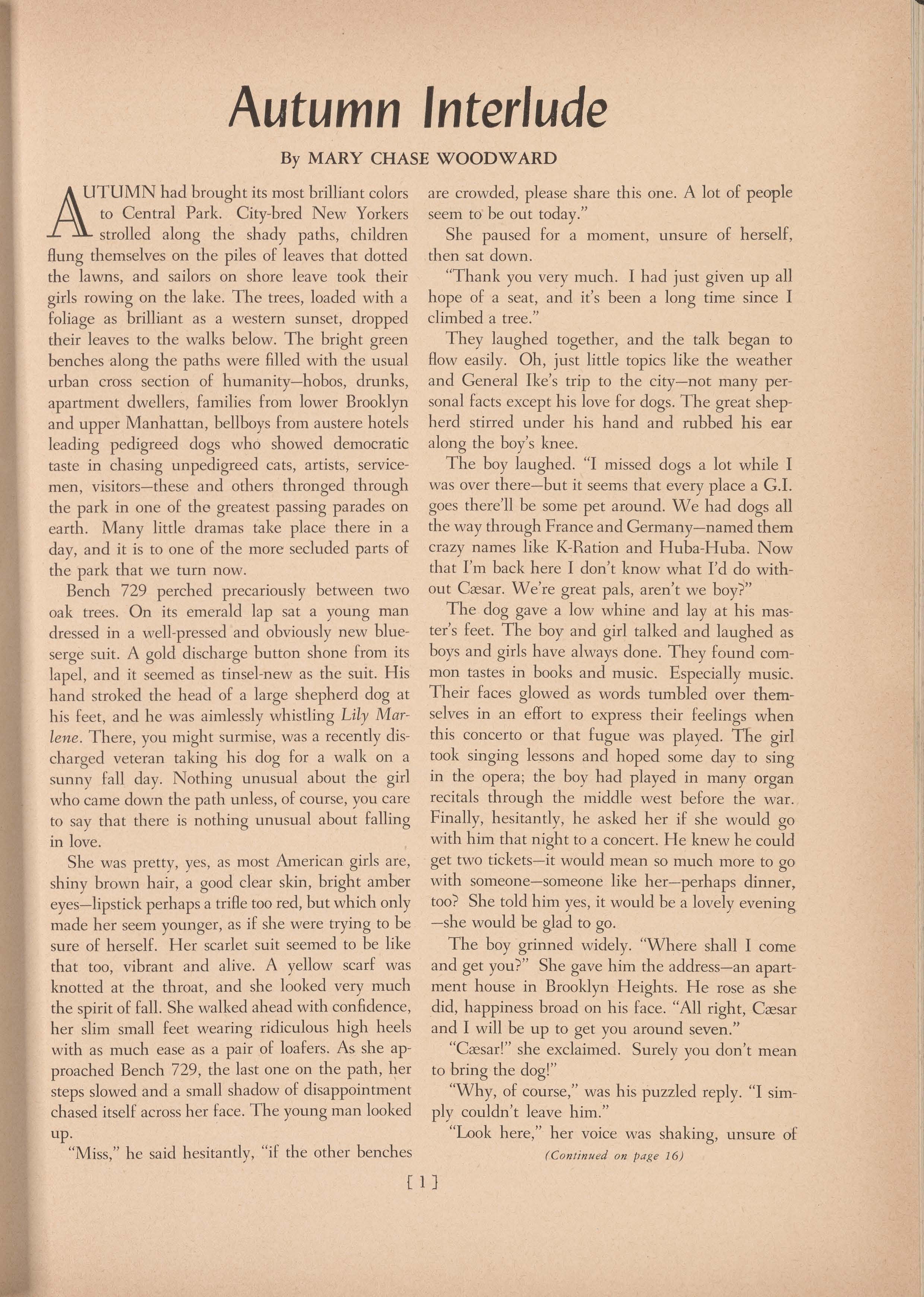
[ 1 ]
High
On a wind-swept shore
Rolled breakers.
And above the ,mnd' s deep roar Were heard The sea gulls.
Bobbing gaily Where 'twas hard to Roat Was driftwood, And back and forth
On the beach Washed pebbles.
Storm....
By SETH DARRO W
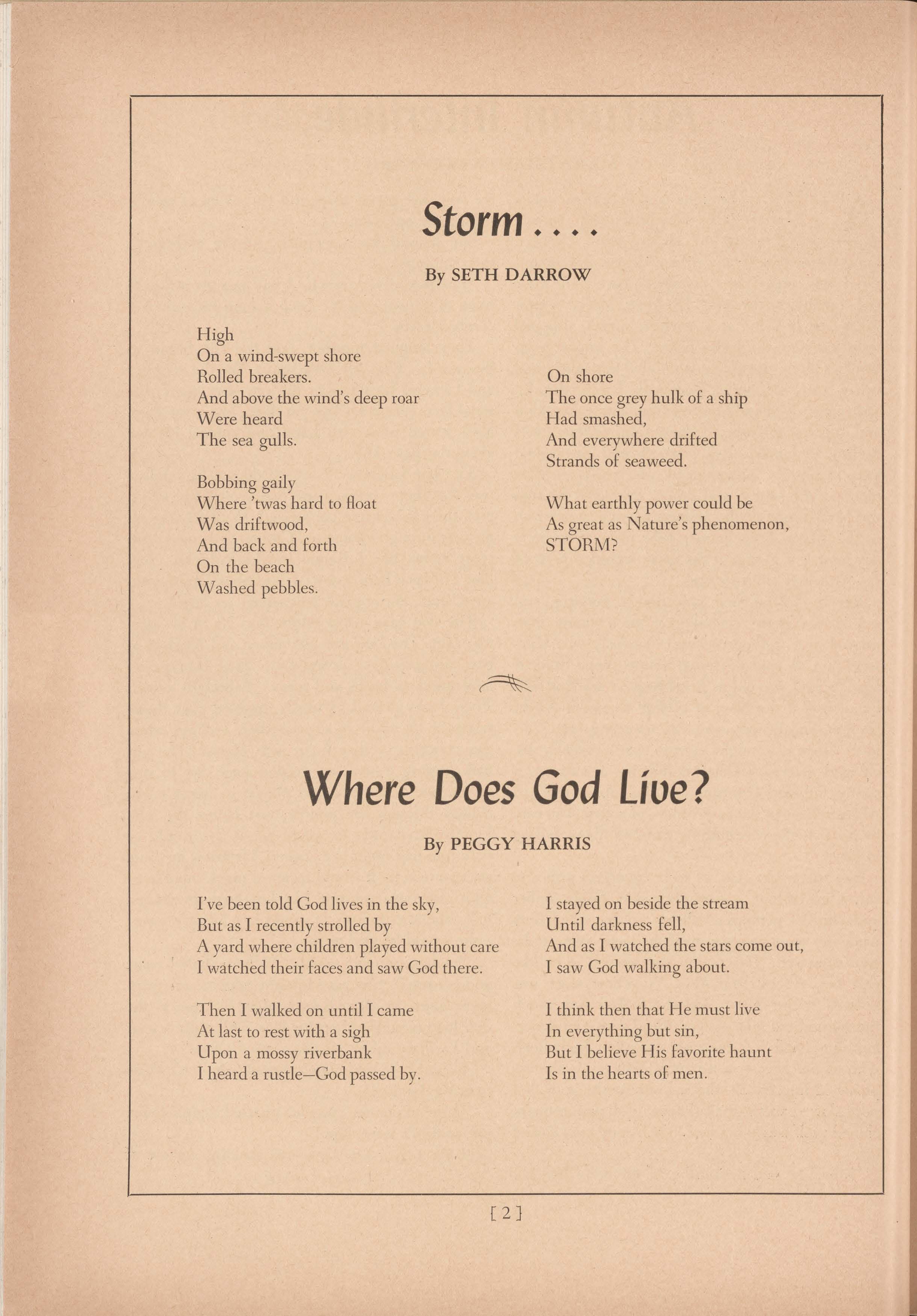
On shore
The once grey hulk of a ship Had smash ed, And everywhere drifted Strands of seaweed.
What earthly power could be As great as Nature's phenomenon, STORM?
WhereDoesGod Live?
By PEGGY H AR RIS
I've been told God lives in the sky, But as I recently strolled by A yard where children played without care
I watched their faces and saw God there.
Then I walked on until I came At last to rest with a sigh Upon a mossy riverbank
I heard a rustle-God passed by. [ 2]
I stayed on beside the stream Until darkness fell, And as I watched the stars come out, I saw God walking about.
I think then that He must live In everything but sin, But I believe His favorite haunt Is in the hearts of men.
NowIs the Time
By MARYL OU MASSIE
THEY had stood upon the bridge a long tim e, the three of them, silently gazing at the ruined city which stretched out on all sides. It was not a pretty sight, this picture of havoc and desolation. Wherever the eye turned there were only heaps of wreckage, blasted walls , and· miles and miles of fine dust. Even the river which had once flowed so serenely beneath the span of white concrete was now choked with debris and fanned out in disconsolate little streams where the shattered arches of the bridge had tumbled and gathered unto themselves floating rubble and made a partial dam. I Iere and there the sun , now beginning to se t, edged up the ragged outline of what had once been a building, rested brieITyon a fallen column lying in broken majesty, or picked out the twisted wreckage of some unrecognizable machine to ITeckwith pin points of light. It was rather like a visual symphony, the rays constantly shifting themes, conducting in first one view of the de~ truction, then fading slowly into another. A strange orchestral vision this, in half -lights and shadows, a symphony in chaos.
The man who stood slightly in front of the other two sighed thoughtfully and raised his arms to fold them against his chest, still contemplating the scene It might well have been a signal to the others, for one shook his head slowly as with grief, while the second moved his hands restlessly, clenching and unclenching the fists.
"So this is it," the said in a whisper, "this is the city, the capital city of a nation whose people were to lead the world into peace." He shook his head fiercely as one "-'ho clashes angry tears from the eyes. "The fools, the blind, blundering, stupid fools. What an opportunity was here, and to let it slip through their fingers like common sand!"
The one in front remained motionless, almost as tl1ough he had not heard, but the other stretched out a restraining hand. Shrugging it off roughly, the speaker continued with the husky voice of one who swallows his sobs.
"Look at their brave new world now dust and ashes. See their temples, the memorials to their heroes, the shining ideals that are blackened with smoke." His hands indicated the wreckage that lay about them in all dircctions 1 and finally pointed
to the crumbling shaft of what had once been an immense monument. "A finger pointing straight to heaven it was, slender and strong and white, built on the faith of a free people to the father of their country. And now? Now a broken obelisk, a broken hope, a relic for the future."
His companion clasped him gently about the shoulder. "Perhaps they tried, Peter," he said sadly, his eyes upon the ruins of a distant building. The sun sinking lower was highlighting what seemed to be the only part of it left intact, a statue that stood with impressive dignity among a forest of broken columns. "Perhaps they tried," he said again, thoughtfully, " and yet it is hard to know sometimes if they even believed in the ideals they so glibly professed." He glanced again across tl1e water. " 'I hold these truths to be self-evident, that all men are created equal ', 'With malice toward none, with charity for all . . . ' but who dared put these, actually, in his credo? Was it all just a part of their philosophical farce, a sort of national anthem to be spieled off automatically with no thought for its meaning? 'In God we trust,' they said, and what did they know of God? It's hard to ay," he went on softly, letting his arms fall heavily as if in despair, "just how much they will ever know about life about God."
The one who had been standing a little to the front of the others turned suddenly at this and stepped toward them, the long, slanting rays of the sun lighting his face with a strange radiance. "Don't say that, John," his voice was fraught with a deep tenderness. "You know so much better than that. Peoples change, nations pass, and the world grows along with each generation not only in _ the fine points of wholesale destruction, but in wisdom and beauty and understanding as well." Stooping, he scooped up a handful of tl1e fine dust that lay at their feet. "From these ashes, someday, there will spring phoenix-like ·a new people, a new nation, a new world, where hatred and fear are no more, and differences i'n faith and color are as the differences of Rowers, a part of earth's variety, and nothing else." The sand slipped through his fingers, and turning his head slightly so that the light of the fast setting sun emphasized the strong square
(Continued on /1age 14)
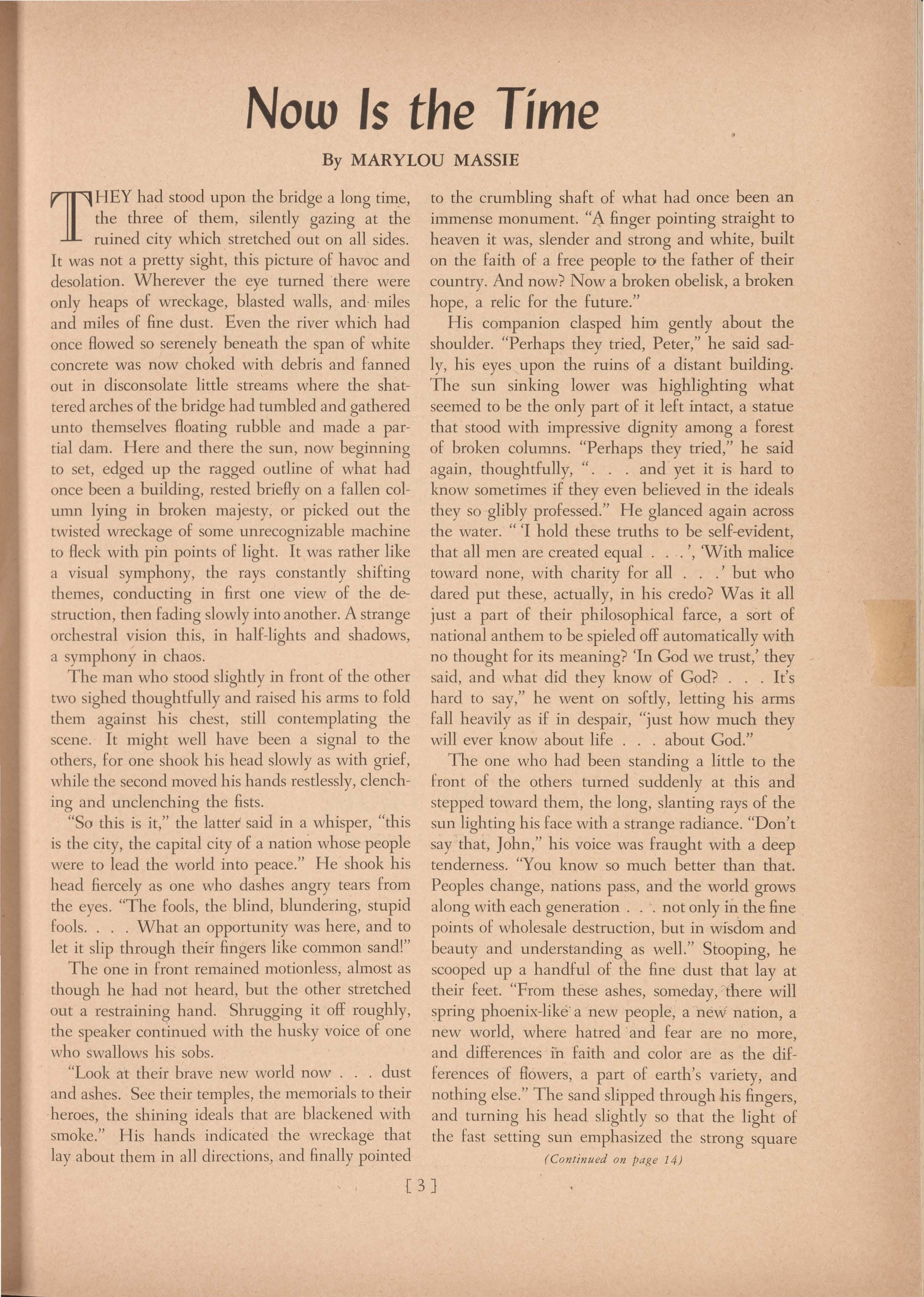
[ 3 ]
SongWithoutMusic
By PEGGY BO W DLER
Journey deep into the past. Slip behind the wall of today and release yourself in the silence.
The grass is deep, the sunshine warm. What better place for sleep-bordered meditation or dreams?
But as you drowse away the hours, do not forget to contemplate the deep-rooted vine of memory as it straddles the cmmbling barrier between here and there.
You've always known the past held more than mere forgetfulness. Why then shrink away when you see the tendrils of the vine curl eagerly over, under, and across the heart of the present-and crush it?
You knew it all the while.
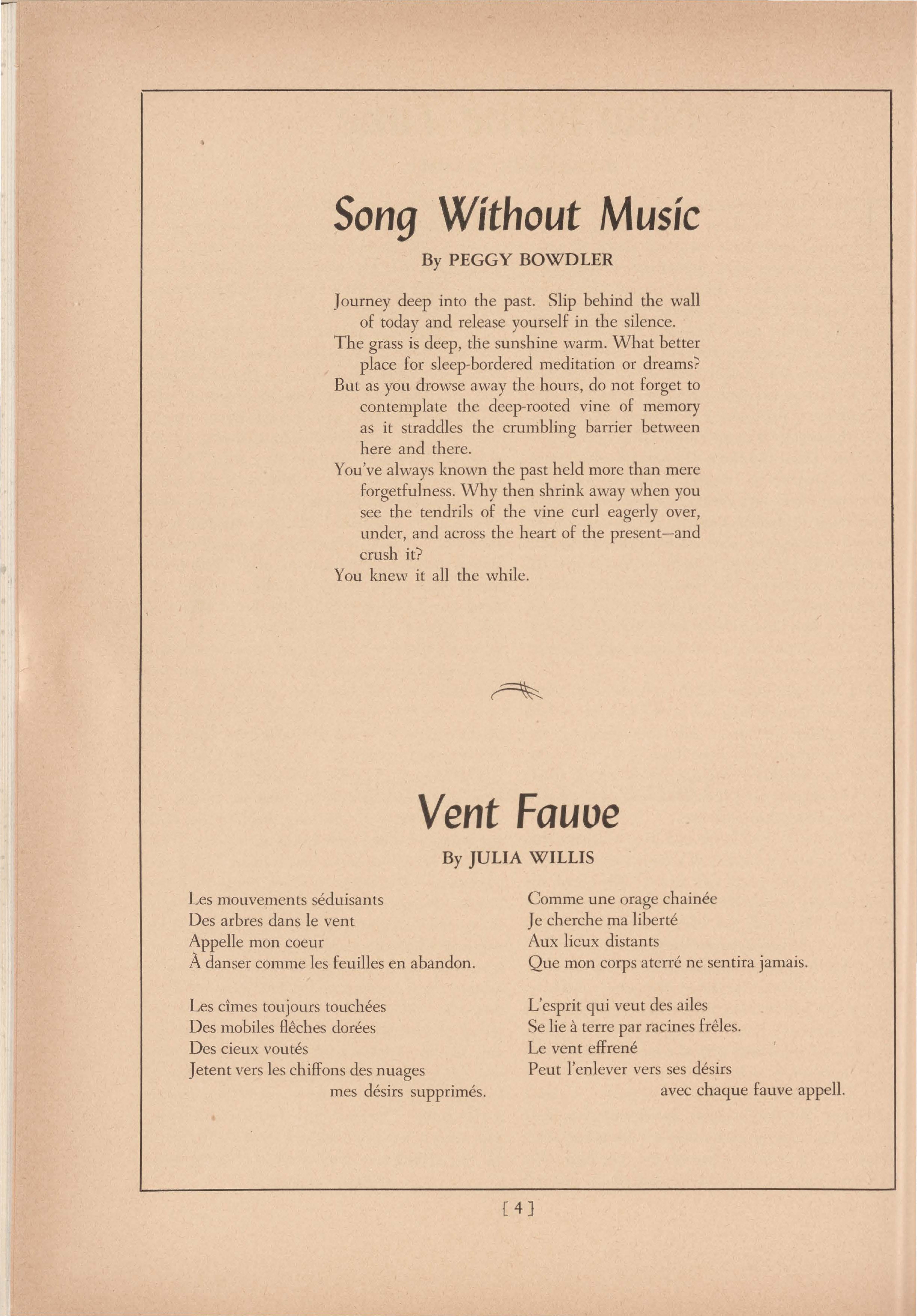
Vent Fauve
By JULIA WIL LIS
Les mouvements seduisants
Des arbres clans le vent
Appelle man coeur
A danser comme les feuilles en abandon.
Les dmes toujours touchees
Des mobiles 8eches dorees
Des cieux voutes
Jetent vers les chiffons des nuages mes desirs supprimes.
Comme une orage chainee
Je cherche ma liberte
Aux lieux distants
Que man corps aterre ne sentira jamais.
L'esprit gui veut des ailes
Se lie a terre par racines freles.
Le vent effrene
Peut l'enlever vers ses desirs avec chaque fauve appell.
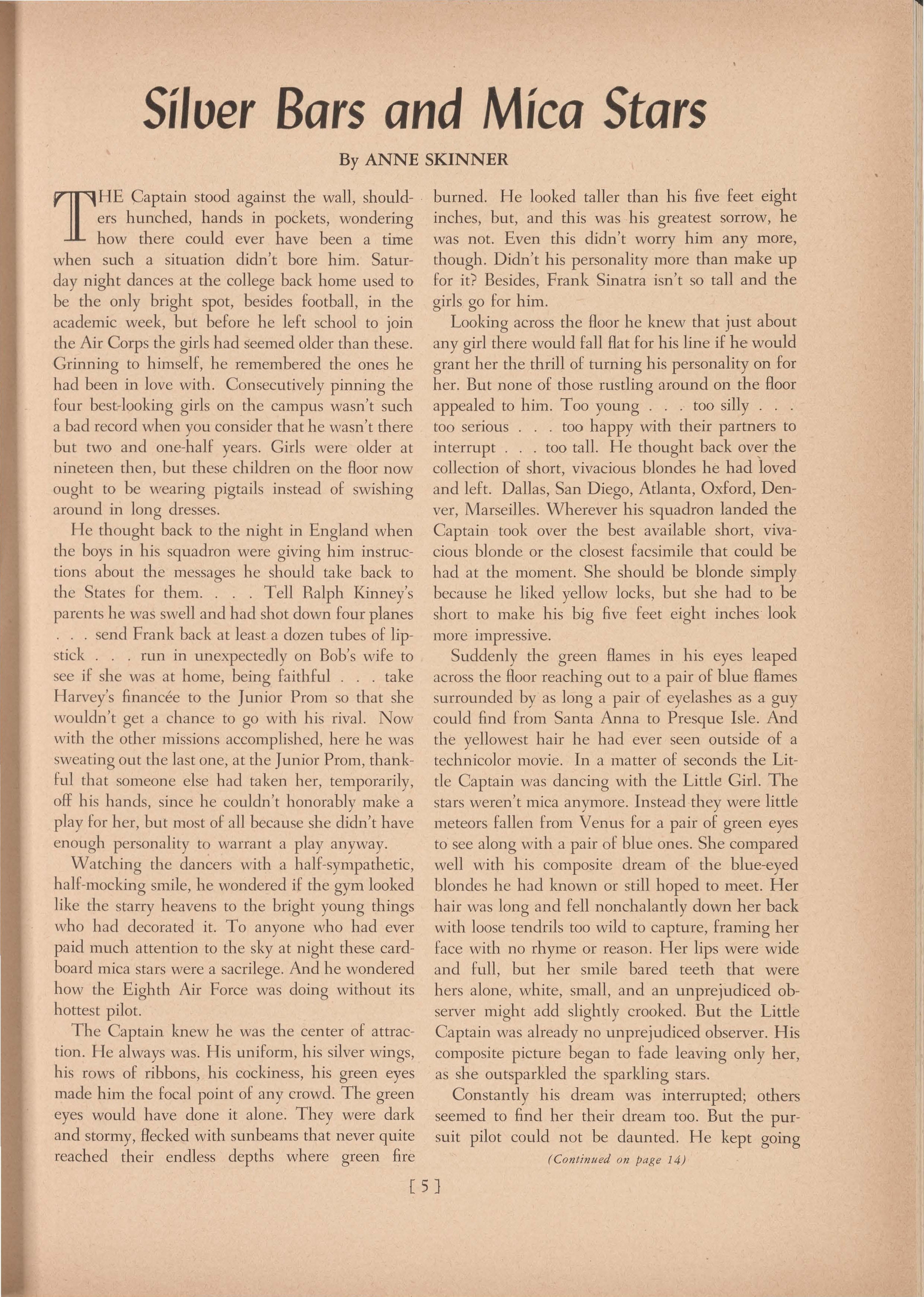
SilverBarsand MicaStars
By A N N E SKINN ER
THE Captain stood against the wall, should-ers hunched, hands in pockets, wondering how there could ever have been a time when such a situation didn ' t bore him Saturday night dances at the college back home used to be the only bright spot, besides football, in the acad emic week, but before he left school to join the Air Corps the girls h ad seemed older than these. Grinning to himself, he remembered the ones he had been in love with Consecutively pinning the four best -looking girls on the campus wasn't such a bad record when you consid e r that he wasn't there but two and one -half ye ars. Girls were older at nineteen then, but these children on the Boor now ou ght to be wearing pigtails instead of swishing around in long dresses.
He thought back to the night in England when the boys in his squadron were givin g him instmctions about the messages h e should take back to th e States for them. Tell Ralph Kinney 's p ar ents he was swell and had shot down four planes send Frank back at least a dozen tubes of lipstick run in unexpectedl y on Bob's wife to see if she was at home, being faithful . . . take Harv ey's financee to the Junior Prom so that she wouldn't get a chance to go with his rival. Now with the other missions accomplished, here he was sweating out the last one, at the Junior Prom, thankful that someone else had taken her , temporarily, off his hands , since he couldn't honorably make a play for her , but most of all because she didn't have enough personality to warrant a play anyway.
Watching the dancers with a half -sympathetic, half -mocking smile, he wondered if the gym looked like th e starry heavens to the biight young things who had decorated it. To anyone who had ever paid much attention to the sky at night these cardboard mica stars were a sacrilege. And he wondered how the Eighth Air Force was doing without its hottest pilot.
The Captain knew he was the center of attraction. He always was. His uniform, his silver wings , his rows of ribbons, his cockiness, his green eyes made him the focal point of any crowd. The green eyes would have done it alone. They were dark and stormy, Recked with sunbeams that never quite reached their endless depths where green fire
burned. He looked taller than his five feet eight inches, but, and this was his greatest sorrow, he was not. Even this didn't worry him any more, though. Didn't his personality more than make u p for it? Besides, Frank Sinatra isn't so tall and the girls go for him.
Looking across the Boor he knew that just about any girl there would fall Bat for his line if he would grant her the thrill of turning his personality on for her . But none of those rustling around on the Boor appealed to him. Too young too silly too serious . . . too happy with their partners to interrupt . . . too tall. He thought back over the collection of short, vivacious blondes he had loved and left. Dallas, San Diego, Atlanta, Oxford, Denver, Marseilles. Wherever his squadron landed the Captain took over the best available short, vivacious blonde or the closest facsimile that could be had at the moment. She should be blonde simply because he liked yellow locks, but she had to be short to make his big five feet eight inches look more 1mpress1ve
Suddenly the green Hames in his eyes leaped across the Boor reaching out to a pair of blue flames surrounded by as long a pair of eyelashes as a guy could find from Santa Anna to Presque Isle. And the yellowest hair he had ever seen outside of a technicolor movie. In a matter of seconds the Little Captain was dancing with the Little Girl. The stars weren't mica anymore. Instead they were little meteors fallen from Venus for a pair of green eyes to see along with a pair of blue ones. She compared well with his composite dream of the blue-eyed blondes he had known or still hoped to meet Her hair was long and fell nonchalantly down her back with loose tendrils too wild to capture, framing her face with no rhyme or reason. Her lips were wide and full, but her smile bared teeth that were hers alone, white, small, and an unprejudiced observer might add slightly crooked. But the Little Captain was already no unprejudiced observer. His composite picture began to fade leaving only her , as she outsparkled the sparkling stars
Constantly his dream was intermpted; others seemed to find her their dream too. But the pursuit pilot could not be daunted. He kept going ( Con t inu ed o n p ag e 14}
[ 5 J
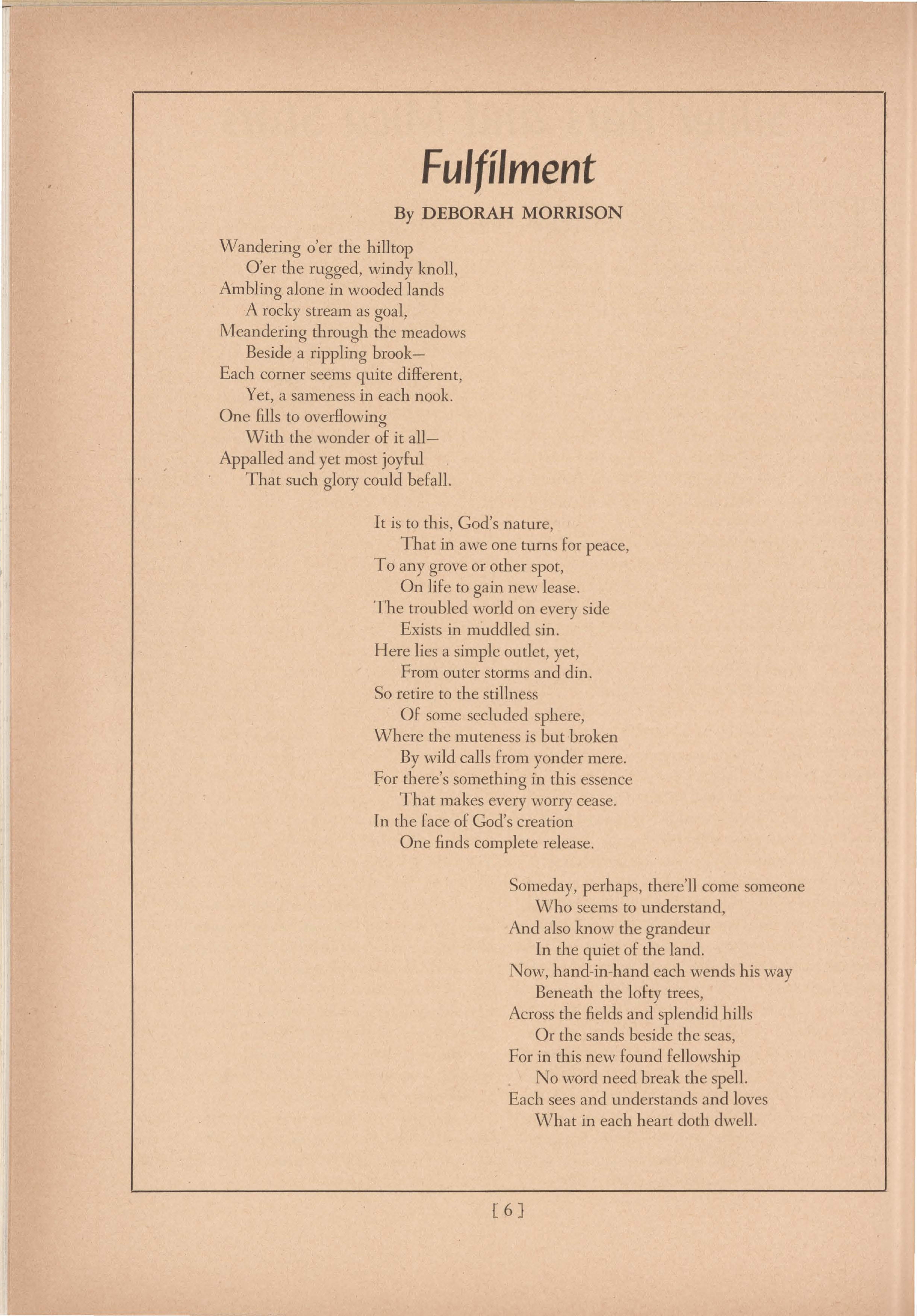
Fulfilment
By D EBORAH MORRISON
Wandering o'er the hilltop
O'er the rugged , windy knoll, Ambling alone in wooded lands
A rocky stream as goal, Meandering through the meadows
Beside a rippling brookEach corner seems quite different, Yet, a sameness in each nook. One fills to overflowing With the wonder of it allAppalled and yet most joyful
That such glory could befall.
It is to this , God's nature, That in awe one turns for peace, To any grove or other spot, On life to gain new lease. The troubled world on every side Exists in muddled sin. Here lies a simple outlet, yet, From outer storms and d in. So retire to the stillness
Of some secluded sphere , Where the muteness is but broken By wild calls from yonder mere. For there's something in this essence That makes every worry cea e In the face of God's creation
One finds complete release.
Someday , perhaps, there'll come someone \ i\lho seems to understand, And also know the grandeur
In the quiet of the land.
Now, hand-in- h and each wends his way
Beneath the lofty trees , Across the fields and splendid hills
Or the sands beside the seas, For in this new found fell owship No word need break the spell.
Each sees and understands and loves
What in each heart doth dwell.
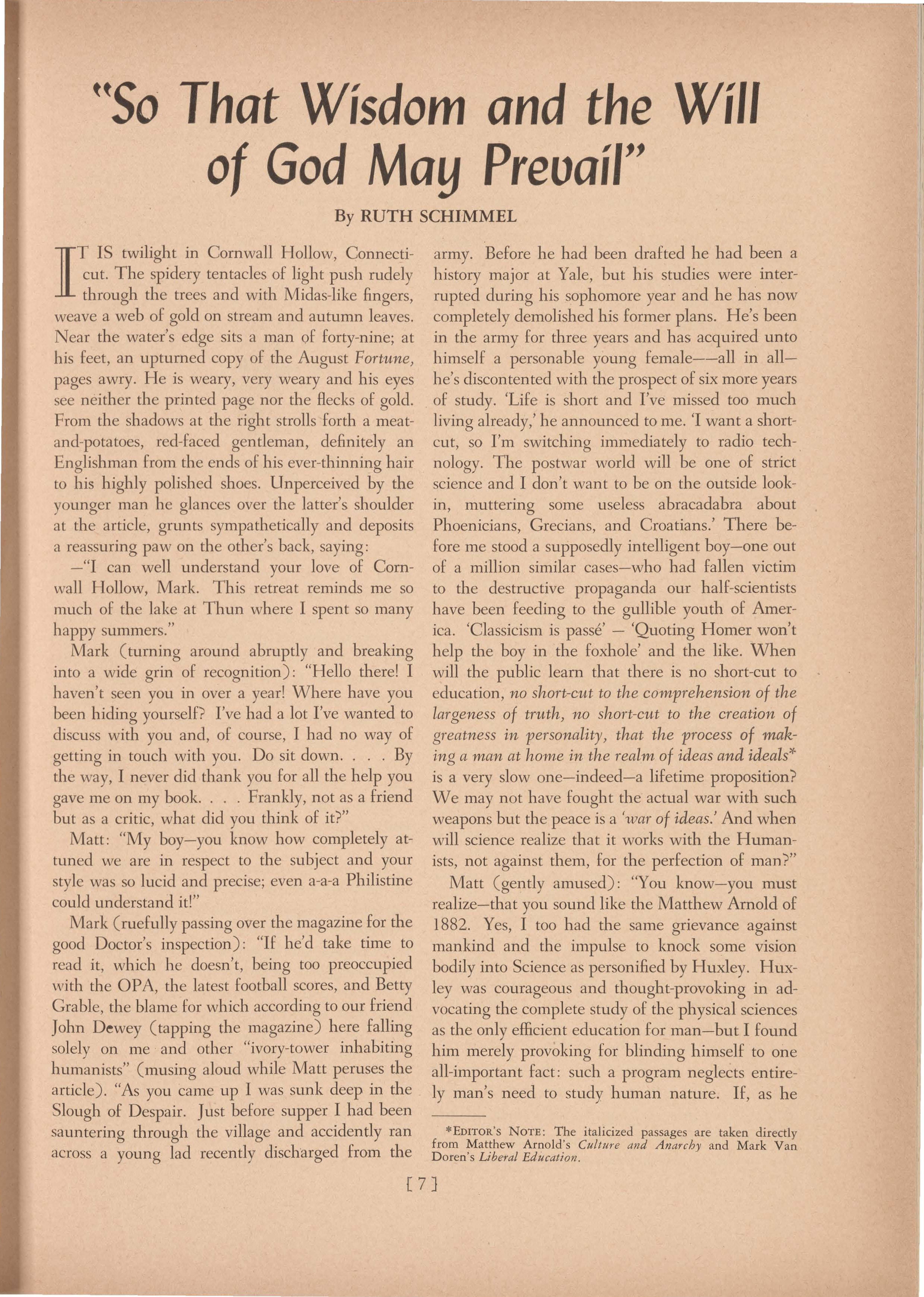
ttSoThat Wisdomand the Will of GodMay Prevail"
By RUTH SCHIMMEL
KT IS twilight in Cornwall Hollow, Connecticut. The spidery tentacles of light push rudely through the trees and with Midas -like fingers, weave a web of gold on stream and autumn leaves. Near the water's edge sits a man of forty-nine; at his feet, an upturned copy of the August Fortune , pages awry. He is weary, very weary and his eyes see neither the printed page nor the flecks of gold. From the shadows at the right strolls forth a meatand -potatoes, red -faced gentleman, definitely an Englishman from the ends of his ever-thinning hair to his highly polished shoes. Unperceived by the younger man he glances over the latter ' s shoulder at the article, grunts sympathetically and deposits a reassuring paw on the other ' s back, saying:
-"I can well understand your love of Cornwall Hollow, Mark. This retreat reminds me so much of the lake at Thun where I spent so many I " rnppy summers.
Mark (turning around abruptly and breaking into a wide grin of recognition) : "Hello there! I haven ' t seen you in over a year! Where have you been hiding yourself? I've had a lot I've wanted to discuss with you and, of course, I had no way of getting in touch with you. Do sit down . . .. By the way, I never did thank you for all the help you gave me on my book. Frankly, not as a friend but as a critic, what did you think of it?"
Matt: "My boy-you know how completely attuned we are in respect to the subject and your style was so lucid and precise; even a-a-a Philistine could understand it!"
Mark (ruefully passing over the magazine for the good Doctor's inspection) : "If he'd take time to read it , which he doesn't, being too preoccupied with the OPA, the latest football scores, and Betty Grable, the blame for which according to our friend John Dewey (tapping the magazine) here falling solely on me and other "ivory-tower inhabiting humanists" (musing aloud while Matt peruses the article). "As you came up I was sunk deep in the Slough of Despair. Just before supper I had been sauntering through the village and accidently ran across a young lad recently discharged from the
army. Before he had been drafted he had been a history major at Yale, but his studies were interrupted during his sophomore year and he has now completely demolished his former plans. He's been in the army for three years and has acquired unto himself a personable young female--all in allhe's discontented with the prospect of six more years of study. 'Life is short and I've missed too much living already,' he announced to me. 'I want a shortcut, so I'm switching immediately to radio technology. The postwar world will be one of strict science and I don't want to be on the outside lookin, muttering some useless abracadabra about Phoenicians, Grecians, and Croatians.' There before me stood a supposedly intelligent boy-one out of a million similar cases-who had fallen victim to the destructive propaganda our half -scientists have been feeding to the gullible youth of America. 'Classicism is passe' - 'Quoting Homer won't help the boy in the foxhole' and the like. When will the public learn that there is no short-cut to education, no short-cut to the comprehension of the largeness of truth, no short-cut to the creation of greatness in personality, that the process of making a man at home in the realm of ideas and ideals* is a very slow one-indeed-a lifetime proposition? We may not have fought the actual war with such weapons but the peace is a 'war of ideas.' And when will science realize that it works with the Humanists, not against them, for the perfection of man?"
Matt (gently amused): "You know-you must realize-that you sound like the Matthew Arnold of 1882. Yes, I too had the same grievance against mankind and the impulse to knock some vision bodily into Science as personified by Huxley. Huxley was courageous and thought-provoking in advocating the complete study of the physical sciences as the only efficient education for man-but I found him merely provoking for blinding himself to one all-important fact: such a program neglects entirely man's need to study human nature. If, as he
*EDITOR'S NOTE: The italicized passages are taken directly from Matthew Arnold's Cultttr e and Anarchy and Mark Van D aren's Liberal Education. [ 7]
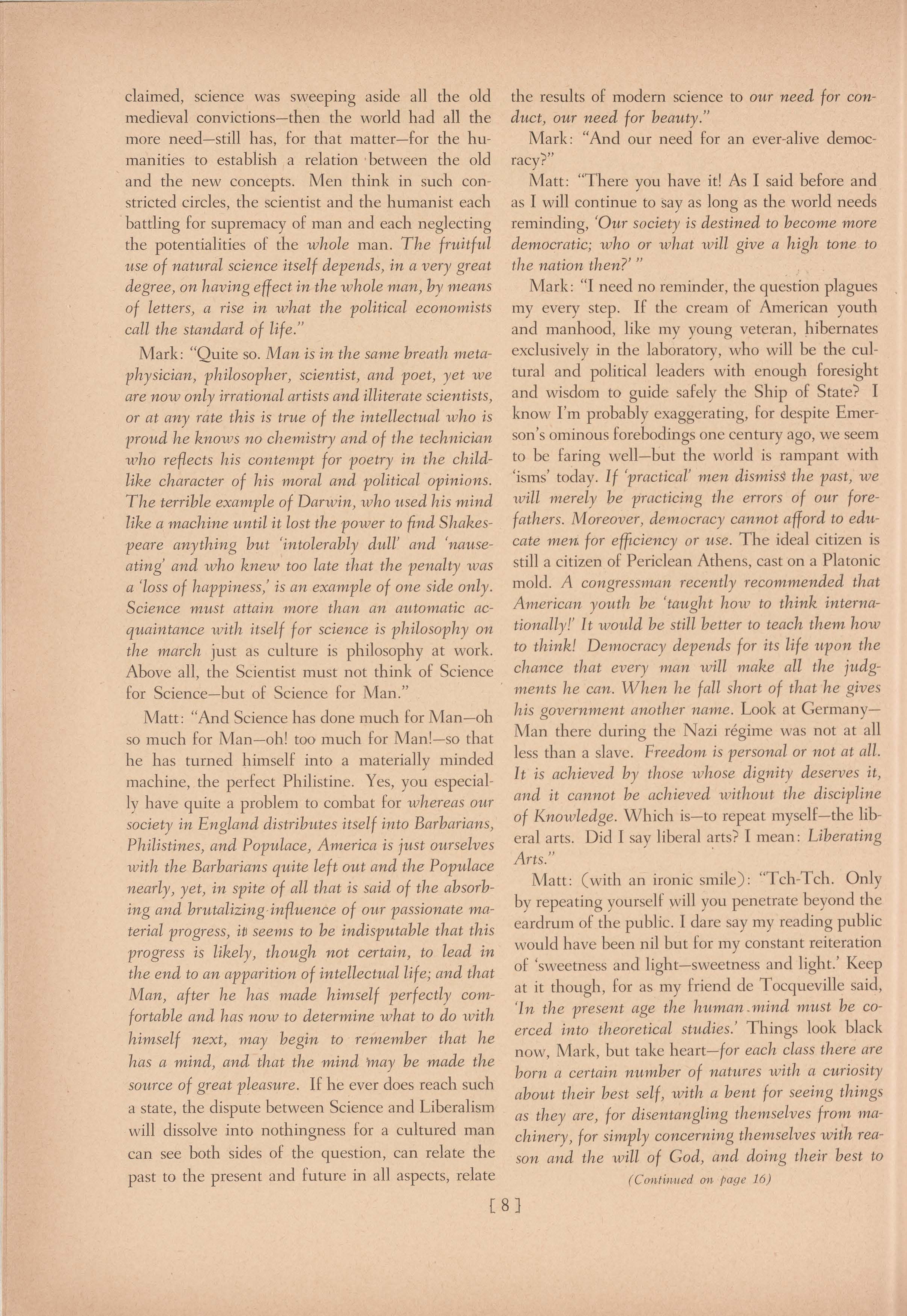
claimed, science was sweeping aside all the old medieval convictions-then the world had all the more need-still has, for that matter-for the humanities to establish a relation ·between the old and the new concepts. Men think in such constricted circles, the scientist and the humanist each battling for supremacy of man and each neglecting the potentialities of the whole man. The fruitful use of natural science itself depends, in a very great degree, on having effect in the whole man, by means of letters, a rise in what the political economists call the standard of life. "
Mark: "Quite so. Man is in the same breath metaphysician , philosopher, scientist, and poet , yet we are now only irrational artists and illiterate scientists, or at any rate this is true of the intellectual who is proud he knows no chemistry and of the technician 1vho refiects his contempt for poetry in the childlike character of his moral and political opinions. The terrible example of Darwin , who used his mind like a machine until it lost the power to find Shakespeare anything but 'intolerably dull ' and 'nauseating' and who knew too late that the penalty was a ' loss of happiness,' is an example of one side onl y. Science must attain more than an automatic acquaintance with itself for science is philosophy on the march just as culture is philosophy at work. Above all, the Scientist must not think of Science for Science-but of Science for Man."
Matt: "And Science has done much for Man-oh so much for Man-oh! too much for Man!-so that he has turned himself into a materially minded machine, the perfect Philistine. Yes, you especially have quite a problem to combat for whereas our society in England distributes itself into Barbarians , Philistines, and Populace , America is just ourselves with the Barbarians quite left out and the Populace nearly, yet, in spite of all that is said of the absorbing and brutalizing -infiuence of our passionate material progress, iti seems to be indisputable that this progress is likely, though not certain, to lead in the end to an apparition of intellectual Zife; and that Man, after he has made himself perfectly comfortable and has now to determine what to do with himself next, may begin to remember that he has a mind , and that the mind 'may be made the source of great pleasure, If he ever does reach such a state, the dispute between Science and Liberalism will dissolve into nothingness for a cultured man can see both sides of the question, can relate the past to the present and future in all aspects, relate
the results of modem science to our need for conduct, our need for beauty."
Mark: "And our need for an ever -alive democracy?"
Matt: "There you have it! As I said before and as I will continue to say as long as the world needs reminding, 'Our society is destined to become more democratic; who or what will give a high tone to the nation then?' "
Mark: "I need no reminder, the question plagues my every step. If the cream of American youth and manhood, like my young veteran, hibernates exclusively in the laboratory, who will be the cultural and political leaders with enough foresight and wisdom to guide safely the Ship of State? I know I'm probably exaggerating, for despite Emerson's ominous forebodings one century ago, we seem to be faring well-but the world is rampant with ' isms ' today. If 'practical' men dismiss the past, we will merely be practicing the errors of our forefathers . Moreover , democracy cannot afford to educate men for efficiency or use. The ideal citizen is still a citizen of Periclean Athens, cast on a Platonic mold. A congressman recently recommended that American youth be 'taught how to think internationally!' It would be still better to teach them how to think! Democracy depends for its life upon the chance that every man will make all the judgments he can. When he fall short of that he gives his government another name. Look at GermanyMan there during the Nazi regime was not at all less than a slave. Freedom is personal or not at all. It is achieved by those whose dignity deserves it , and it cannot be achieved without the discipline of Knowledge. Which is-to repeat myself-the liberal arts. Did I say liberal arts? I mean: Liberating Arts. " ·
Matt: ( with an ironic smile ) : "Tch-Tch. Only by repeating yourself will you penetrate beyond the eardrum of the public. I dare say my reading public would have been nil but for my constant reiteration of 'sweetness and light-sweetness and light. ' Keep at it though, for as my friend de Tocqueville said, 'In the present age the human mind must be coerced into theoretical studies. ' Things look black now, Mark, but take heart-for each class there are born a certain number of natures with a curiosity about their best self, with a bent for seeing things as they are, for disentangling themselves from machinery, for simply concerning themselves with reason and the will of God, and doing their best to ( Contin11ed on pag e 16)
[ 8]
Variationon a Theme
By FLETCHER STIERS, JR.
A ONE-ACT PLAYLET
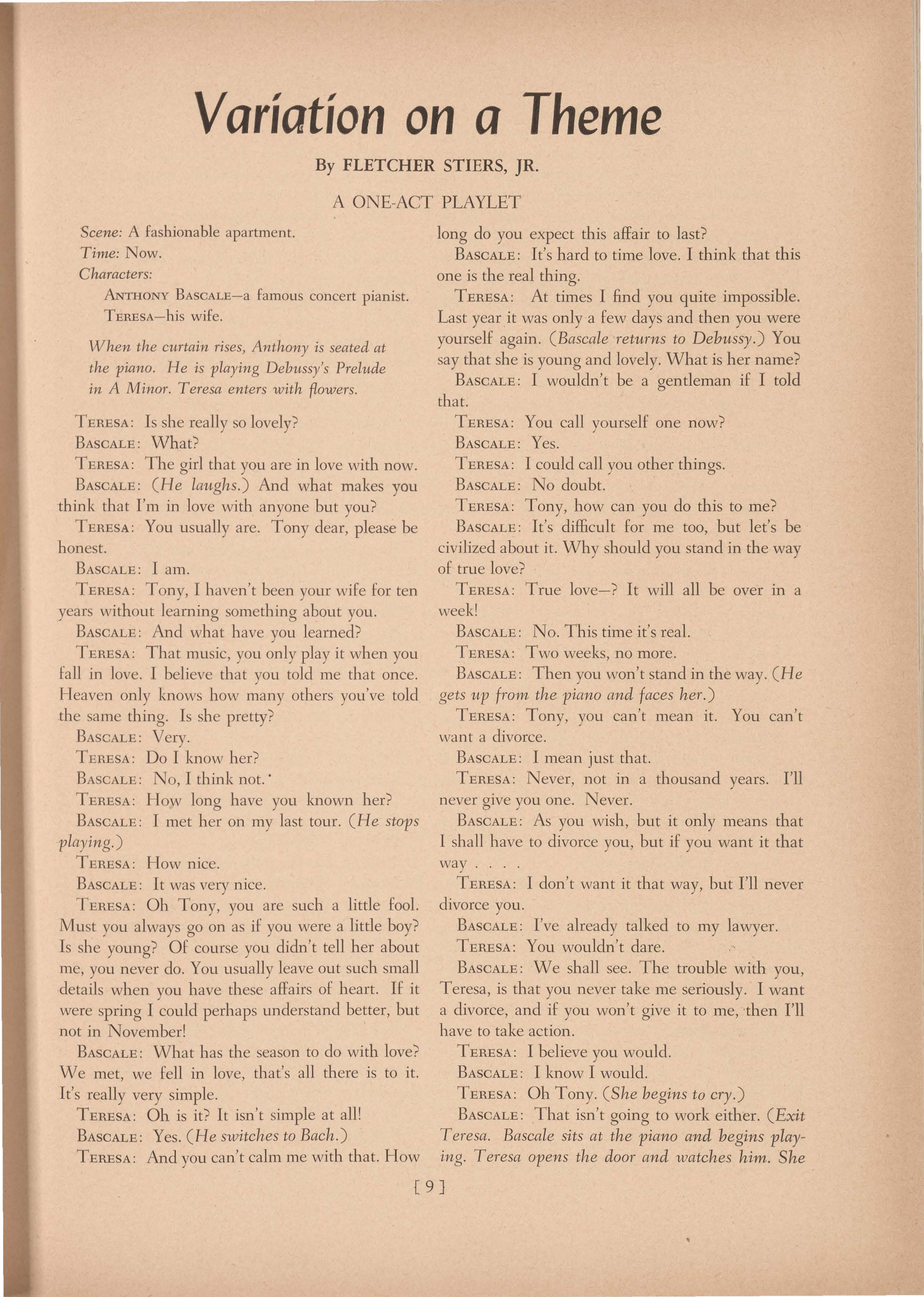
Scene: A fashionable apartment.
Time: Now.
Characters:
ANTHONY BASCALE-a famous concert pianist. TERESA-his wife.
When the curtain rises, Anthony is seated at the piano. He is playing Debussy's Prelude in A Minor. Teresa enters with flowers.
TERESA: Is she really so lovely?
BASCALE:What?
TERESA: The girl that you are in love with now.
BASCALE:(He laughs.) And what makes you think that I'm in love with anyone but you?
TERESA: You usually are. Tony dear, please be honest.
BAsCALE: I am.
TERESA: Tony, I haven't been your wife for ten years without learning something about you.
BASCALE:And what have you learned?
TERESA: That music, you only play it when you fall in love. I believe that you told me that once. Heaven only knows how many others you've told the same thing. Is she pretty?
BASCALE:Very.
T ERESA: Do I know her?
BASCALE:No, I thin] not.·
TERESA: I low long have you known her?
BASCALE:I met her on my last tour. (He stops playing.)
TERESA: How nice.
BASCALE:It was very nice.
TERESA: Oh Tony, you are such a little fool. Must you always go on as if you were a little boy? Is she young? Of course you didn't tell her about me, you never do. You usually leave out such small details when you have these affairs of heart. If it were spring I could perhaps understand better, but not in November!
BASCALE:What has the season to do with love? We met, we fell in love, that's all there is to it. It's really very simple.
TERESA: Oh is it? It isn't simple at all!
BASCALE:Yes. (He switches to Bach.)
TERESA: And you can't calm me with that. How
long do you expect this affair to last?
BASCALE:It's hard to time love. I think that this one is the real thing.
TERESA: At times I find you quite impossible. Last year it was only a few days and then you were yourself again. (Bascale returns to Debussy.) You say that she is young and lovely. What is her name?
BASCALE:I wouldn't be a gentleman if I told that.
TERESA: You call yourself one now?
BASCALE:Yes.
TERESA: I could call you other things.
BASCALE:No doubt.
TERESA: Tony, how can you do this to me?
BASCALE:It's difficult for me too, but let's be civilized about it. Why should you stand in the way of true love?
TERESA: T me love-? It will all be over in a week!
BASCALE:No. This time it's real.
TERESA: Two weeks, no more.
BASCALE:Then you won't stand in the way. (He gets up from the piano and faces her.)
TERESA: Tony, you can't mean it. You can't want a divorce.
BAsCALE: I mean just that.
TERESA: Never, not in a thousand years. I'll never give you one. Never.
BASCALE:As you wish, but it only means that I sha 11have to divorce you, but if you want it that way
TERESA: I don't want it that way, but I'll never divorce you.
BAsCALE: I've already talked to my lawyer.
TERESA: You wouldn't dare.
BASCALE:We shall see. The trouble with you, Teresa, is that you never take me seriously. I want a divorce, and if you won't give it to me, then I'll have to take action.
TERESA: I believe you would.
BASCALE:I know I would.
TERESA: Oh Tony. (She begins to cry.)
BASCALE:That isn't going to work either. (Exit Teresa. Bascale sits at the piano and begins playing. Teresa opens the door and watches him. She [ 9]
does not know that he sees her Bascale goes to the phone and pretends to dial.) Hello, Madge dearest. I just told Teresa about us. She took it rather hard, poor girl. I think we will be married by Christmas. Are you as lovely as ever, my sweet? Do you know that it's been hours since I saw you last? I miss you so. How about tonight? Good. I'll see you about eight then. Good-bye, dearest. (He puts the phone down and goes back to the piano. He begins to play, after awhile Teresa re-enters. She is dressed in an evening gown. He makes believe that he doesn't see her.)
TERESA: Were you talking to some one?
BASCALE:Max. He wants to see me tonight about my next tour. If you, think that dress is going to keep me from wanting a divorce, you're a little fool.
TERESA: If you think I put it on because of you, it is you who are the fool.
BASCALE:What do you mean by that?
TERESA: Nothing. And if I did, I don't see where it would be any concern of yours
BAsCALE: It doesn't matter.
TERESA: Tony, you said that this girl is young well ?
BAsCALE:Well?
TERESA: Have you looked in a mirror lately?
BAsCALE:Yes, this morning when I shaved.
TERESA: Then didn't you see?
BAsCALE:What should I have seen?
TERESA: You're getting old, Tony. O-L-D!
BASCALE:(He bangs the keys.) Old?
TERESA: Well, you will be in a few years. You should be expecting it. It happens to everyone sooner or later. Don't worry about it.
BASCALE:Don't worry! So you think I'm getting old?
TERESA: Well, it's the truth.
BAsCALE: Teresa, you've hurt me deeply.
TERESA: And you've hurt me. Now we're even. I think I'll go out tonight. I'll have to get my coat. (Exit Teresa. Bascale gets up and goes to the mirror and realizes that what she has said is the truth. Teresa re-enters with her coat.)
TERESA: You see, I was telling the truth.
BAsCALE:Please, let's not be vulgar.
TERESA: So the truth hurts.
BASCALE:Yes, it hurts. (She laughs.) Where are you going?
TERESA: Out.
BASCALE:I can see that.
TERESA: Then why did you ask?
BASCALE:Because you are still my wife.
TERESA : Rea lly?
BASCALE:Really!
TERESA: Good-bye. Tell Max hello.
BAsCALE:Teresa, it looks like it might rain.
TERESA: I have my coat.
BAsCALE:But you might catch cold.
TERESA: Why should that matter to you?
BAsCALE:It's no matter to me. I'm only trying to watch out for you.
TERESA: So now you want to watch out for me. I thought that you wanted a divorce, Tony dear.
BASCALE:I do, but after all, you are still my wife. (Again she laughs.) You think that's funny?
TERESA: You usually are.
BASCALE:I made you cry only a little while ago.
TERESA: That was because you hurt me.
BASCALE:You hurt me first. You aid I was getting old.
TERESA: Tony, let's not go all over that again tonight. I'm not up to it. If you don't mind, I'll go now?
BASCALE:I'm not holding you here. I'm not the one who started this in the first place. You brought the question up .
TERESA: There you go again.
BASCALE:I'm sorry. Look! It's raining out now. Don't go out, Teresa, you might catch cold.
TERESA: Do you want me to stay, Tony?
BAsCALE:I didn't say that. '
TERESA: o, you didn't, but you implied a much. (She starts to leave.)
BASCALE:Teresa
TERESA: Yes
BASCALE:Teresa, I am getting old.
TERESA: I know it. I told you so.
BASCALE:Please don't go.
TERESA: Do you really want me to stay?
BASCALE:I've said so. Must! beg you?
TERESA: But I don't see why I should stay in tonight. Don't forget that you have an appointment with Max tonight, and i[ you are going out, I don't see why I shouldn't.
BASCALE:Teresa, come back.
TERESA: What about that appointment?
BAsCALE:That can wait. (She comes back into the room and takes off her coat.) Teresa, there's . something I want to tell you. It wasn't Max I was supposed to meet tonight.
TERESA: Madge?
BASCALE: I low did you know?
(Conti1111edon page 16)
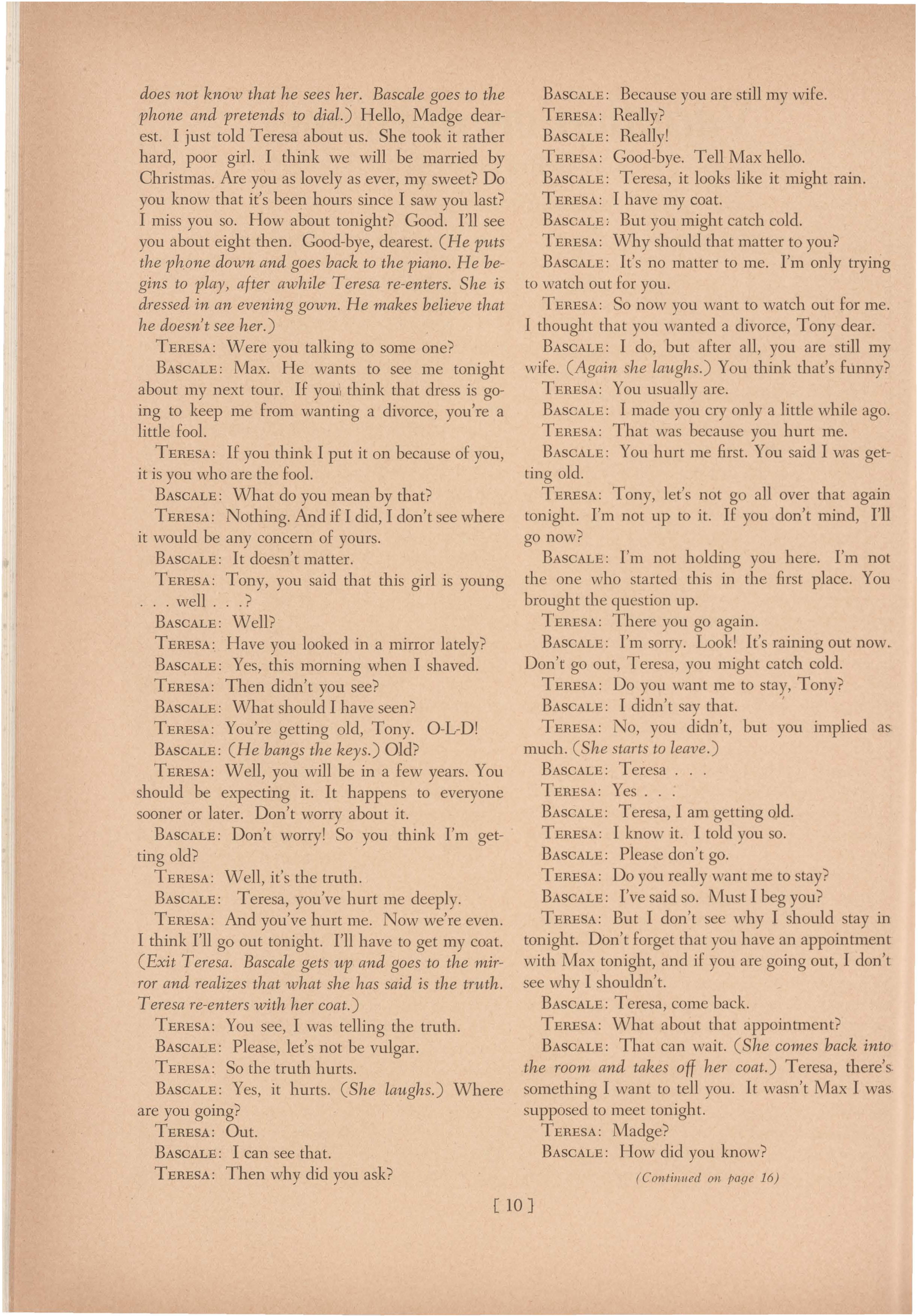
[ 10]
Eveningat Camp
By EDWARD T. CLARK, JR.
On the dunes of Miniwanca
On Vesper Dune at dusk, I watch the sun-kissed lake
With the deep'ning blue of night Falling quietly o'er its waters
The sinking sun drops neath the blue, And clouds pick up the last pink rays, To show that tho' the sun is gone from sight Her warmth and beauty linger yet To still the troubled mind.
Then the quiet heavens open
And here and there a twinkling star Slowly mounts the deep'ning dark, 'Til the heavens are covered with A spangled host of dancing lights.
On the beach the sands grow cool, The turbulent waters rise.
And amid the growing darkness I sit With night's grandeur filling my heart. 0 God of beauty, open our eyes.

[ 11 ]
The Epitaphof Man
B y CA ROLY N MARSH
Man suppressed for centuries, His heart is buried in the soil he tills, No future beyond each narrowing row; He never ventures over the hills.
Chained in a cave of hollow dark, Knowledge, key to the lock, lies near , Waiting in the gloomy mist Waiting for the soul of man to hear.
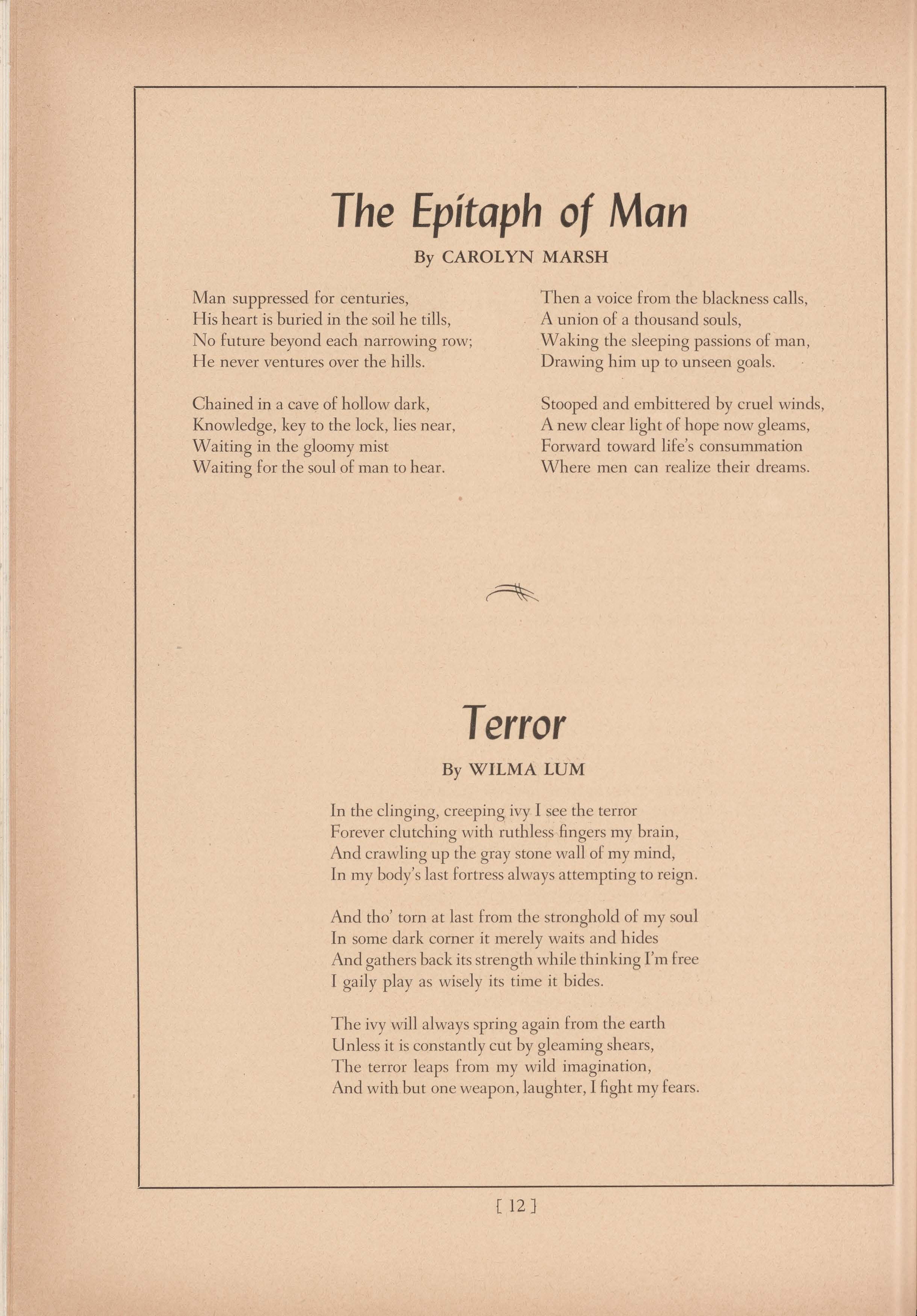
T h en a voice from the b lackness calls, A union of a thousand souls, Waking the sleeping passions of man , Drawing him up to unseen goals.
Stooped and embittered by cruel winds , A new clear light of hope now gleams, Forward toward life ' s consummation Where men can realize their dreams
Terror
B y WI LMA LUM
In the clinging, creeping ivy I see the terror Forever clutching with ruthless fingers my brain, And crawling up the gray stone wall of my mind, In my body's last fortress always attempting to reign.
And tho' torn at last from the strongho ld of my soul In some dark corner it merely waits and hides And gathers back its strength while thinking I'm free I gaily p l ay as wisely its time it bides.
The ivy will always spring again from the earth
Unless it is constantly cut by gleaming shears, The terror leaps from my wild imagination, And with but one weapon, laughter, I fight my fears.
[ 12]
AreYou Nuts? or Part-timeLifeat WRVA
By JAMES W. HEIZER
SO YOU want to be a radio announcer. You want to explore the deep , dark mysteries of radio, and be that mysterious disembodied voice that invades millions of homes with the undeniable state~ent that Slapsaddle Soap will make you beautiful ; that Buz does everything; and that Foreign Minister Bogorskinovschmozkapop resigned today That ' s fine, and more power to you. But ma y I ask you on e question, "Are you nuts?"
ow many of you are no doubt confused by the title of this little story, and I'll admit that it is a hard question to answer without pr ejudice. As for myself, I'll frankly admit that I am beginning to wonder how I am going to build a story around a corny title like that. Still, it is a pertinent question, for it is a common statement among radio a nnouncers that you have to be nuts or you wouldn ' t be any good in radio. And working for WRVA while going to school in th e morning has made me qualify if that is all it takes
Will you parden me a moment while I answer my telephone? That was some lady calling in to ask what time the Bond Show at the Mosque will be over. Now how would I know what time Sinatra will finish with his program of swoon-spoon? Women , I love 'em! They ask such intelligent questions.
Oh yes, that reminds me of the lad y who called in one evening and hummed and dum-de-dum'ed through two choruses of some song I had never even heard before, trying to find out the name of the song. She had a beautiful voice, but I still didn't know the name of it.
Another lady called in just a short time ago, wanting to know whether or not she should send her little boy to school tomorrow. ow I really don't know whether she should or not, but I told her she had better be on the safe side, 'cause where I come from three cuts are all you get.
But back to radio. Comes to mind now some of the little experiences I have had in the radio world. Take for instance the time I went on the air in Roanoke and advertised Rainblow Bled for Rainbow Bread. Then here at WRVA I did a beautiful
job one day on a Vicks commercial, calling an Inhaler an "Inhilater" not once but seven or eight times in succession! I know the sponsors must have loved it.
One of my most famous escapades, however, came during my brief tenure in Roanoke at WDBJ (yes, I left peaceably). A few of us were back in the control room for a little relaxation. Old Jim had possession of the galloping dominoes and was having a great deal of trouble making his point . ow someone, accidentally or otherwise, hit the switch and turned on the mike, and over the air waves went my booming voice crying out "Little Joe, in there baby! Come to papa." It's a great surprise to me that my radio career didn't end right then and there.
And then there is always the little problem of phrasing. One announcer friend of mine-and I'm sure he won't mind my telling this little tale-had a program in which there was a hymn called "Oh Jesus, I Have Promised." Well, my friend read the copy "cold" and before going on with the rest of the title, he paused just a little too long after the second word.
It is always a source of enjoyment, too, when you drop a sheet of your copy and have to ad lib until someone can pick it up for you. You should try it some time. You can have a great time trying to beat around the bush until you retrieve your copy.
A favorite of mine are the persons who call up and want to know where they can get, say for example, Bob Hope. You very patiently explain that there is a rumor going around-only a rumor now, mind you-that there are three other stations in the city, and that they mightJ get him on one of them.
My greatest favorites, however , are the guys who call in and ask you to settle an argument. You patiently listen while they go into great detail and then ask you which one is right. If you know, you are okay, but if you don't know, they demand to know how such an ignoramus can be a radio announcer. "This is Information Please, Oscar Levant, speaking."
(Continued on /1age 14)
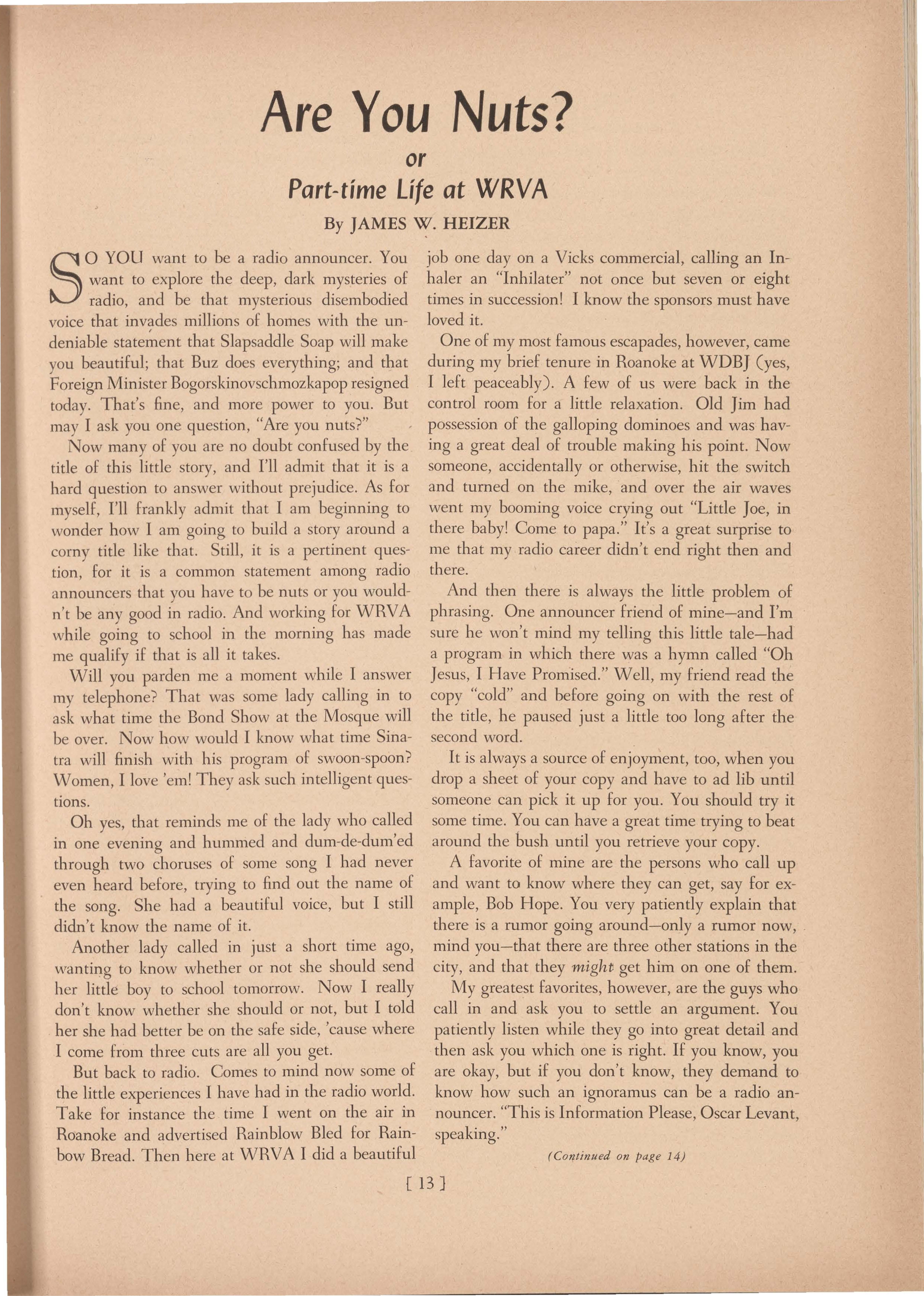
[ 13]
Are You Nuts?
(Conti n ued f, om page 13)
Then there are the routine matters thrown in on the side which make th~ actual work, things like keeping the log of programs and commercials , getting the right recording on the right turntable at the right time , and getting your pleasing voice, the words it must utter, and the signals from the control room into some kind of harmony.
So you still want to be a radio announcer? May I ask you once again, are you nuts? If you're not , we can't use you. YOU JUST GOTTA BE!!!
Now Is the Time
(Cq 11ti111t cd f ro m p age 3)
chin , the mouth with its deeply cleft lines of suffering, the sensitive nose, and hidden dreaming eyes, he stretched out his arms toward the city , and there was compassion in his voice as he spoke. "Their opportunity was indeed large, a free people endowed with the capacities for greatness , confronted with the crisis of an age. . . . But they were too busy to use their democracy, the polls were empty on election days, and money and all the other glittering trivialities became the ends rather than the means of their existence. It was a matter of universal indifference , on the part of the pious as well as the faithless, on the part of all who sat idly by and watched with apathy as their world cracked and peeled in a hundred places and eventually began to decay."
The sun had set now and with the fading of its glory had gone the light of his face. He stood a moment, arms still outstretched, a queer, irregular cross against the darkening sky. Then dropping them heavily to his side as though they were weary with the weight of a thousand years, perhaps two thousand , he spoke again, and this time his face was a shadow in the dusk, and his voice a muffied whisper.
' 'Yet someday, some day it will come, and they will be as they were meant to be . . . free from their preJudice, free from their fear, bound only in their love for one another." He ceased for a moment and stepped back to clasp the hands of his companions. The movement stirr ed up a small cloud of dust, obscuring them almost entirely from view , and his voice when it came through the darkness
was muted, so light and low. "But, oh my friends, how long will it take?" that it might have been only the wind who breathed, "When will they learn, when will they learn?"
Silver Bars and Mica Stars
( Co11li111u ed from page 5)
back to claim her again and she was always glad. Suddenly he realied that at the close of the dance she would be gone. But he must see her again. No, she had a late date. A date for tomorrow, too. The Captain's green eyes were appealing . She thought awhile and decided what he knew she would decide-to break her date for him.
He met her for breakfast. She was like the sunshine, the blue sky, the sweetness of the pink roses on the white tablecloth. Then a walk in the fresh morning air, but she seemed more alive than the birds or the Bowers or the little children playing on their way to Sunday school with their pennies clutched in a tight fist. The blue feather on her wisp of a hat matched the blue of her eyes, but it could not be as beautiful. Sitting beside her in church , watching her at dinner, horseback riding through the fields in the afternoon, the Captain knew he loved her as he had never loved before. Too soon the day was over and he must go back to the base.
Waiting for his train he went over t~ the juke box and dropped a nickel in the slot by Remember. She held his hand as he went through his confessions of love, and praises of beauty more eloquently than usual, he thought, because this time he really meant it. And she smiled and played Always.
The Captain did intend to see her again, but first one thing and then another, usually blonde, prevented him from going back. At first he thought of her often, and the mica stars she had turned to silver, but then he stopped wondering if she were sad because he hadn't kept his word as her image faded back into the composite picture of the neverending succession of blue -eyes he had loved . Before long he couldn ' t have told you exactly what she looked like on a bet.
His inconstancy didn't matter a great deal; she had forgotten his green eyes and silver wings when she m e t a ribbon -covered ensign
You see , the stars were mica all the time.
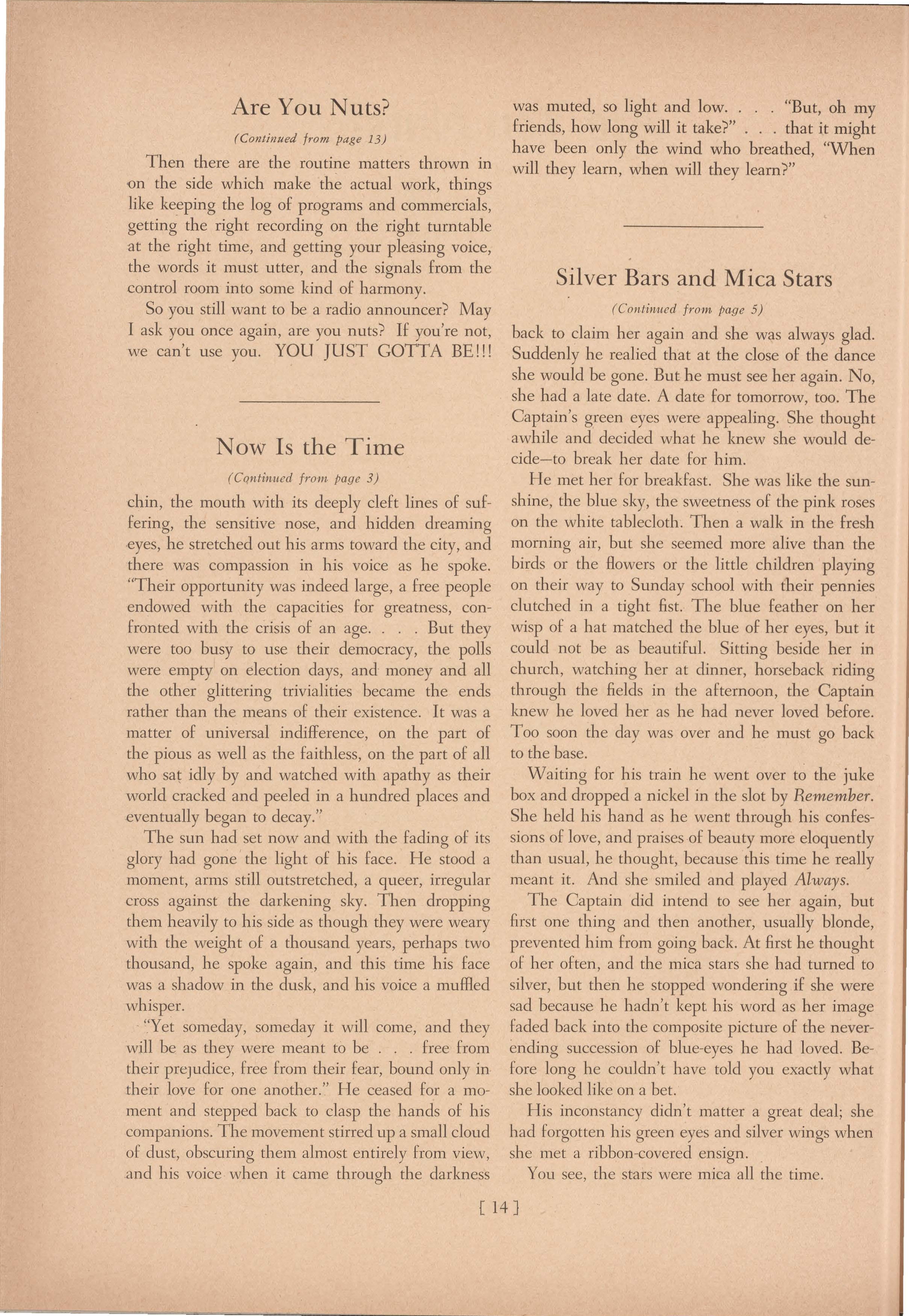
[ 14]
What'sIn a Name?
B y JACQUELINE BA RN ES
0NCE, from eastern ocean to western ocean, the land stretched away without names. Nameless headlands split the surf; nameless lakes reflected nameless mountains; and nameless rivers flowed through nameless valleys into nameless bays." So begins the book Names on the Land,* in which George R. Stewart traces the orowth of names across the United States.
0 First on the continent wer e tribe1, who, even as they died, left the names they had spoken as a h eritage to those who followed. After many centuries the Americans came and they added more names, thousands more , until the country was covered with them, millions of them. A few hundred of the names were known to all, the rest were recognizable only to those who dwelled within the immediate vicinity. "Thus the names lay thickly over the land, and the Americans spoke them, great and little, easily and carelessly-Virginia, Susqueha nna , Rio Grande, Deadman Creek , Sugarloaf Hill, Detroit, Wall Street-not thinking how they h ad come to be. Yet the names had grown out of th e life, and the lifeblood, of all those who had gone before. From the names might be known how here one man hoped and struggled, how there another dreamed, or died, or sought fortune, and another joked , twisting an old name to make a new one-Providence and Battle Mountain, Hardscrabble , Troy, Smackover, Maine , Elrio , Pasadena, Troublesome Creek, Cape Fear , Nashville, Lincoln C ounty, Fourth Crossing "
The country was fortunate, for the names, as a whole , were good and were bound up with land and people. In the countries to east and west the story of the naming has been lost but here the record can still be read-"who gave the names and when, and even why one name was chosen rather th an another." Tvi,enty -six states, eighteen of the greatest cities, most of the larger lakes and longer rivers and a few of the highest mountains and thousands of smaller towns and natural features come dir ectly from the Indian. Arizona and Connecticut , Seattle and Des Moines, Niagara and Potomac were originally Indian, but the white man has adapted th em and shaped them until they are as much Europe an as Indian, if not more so.
*R andom House, 418 pages.
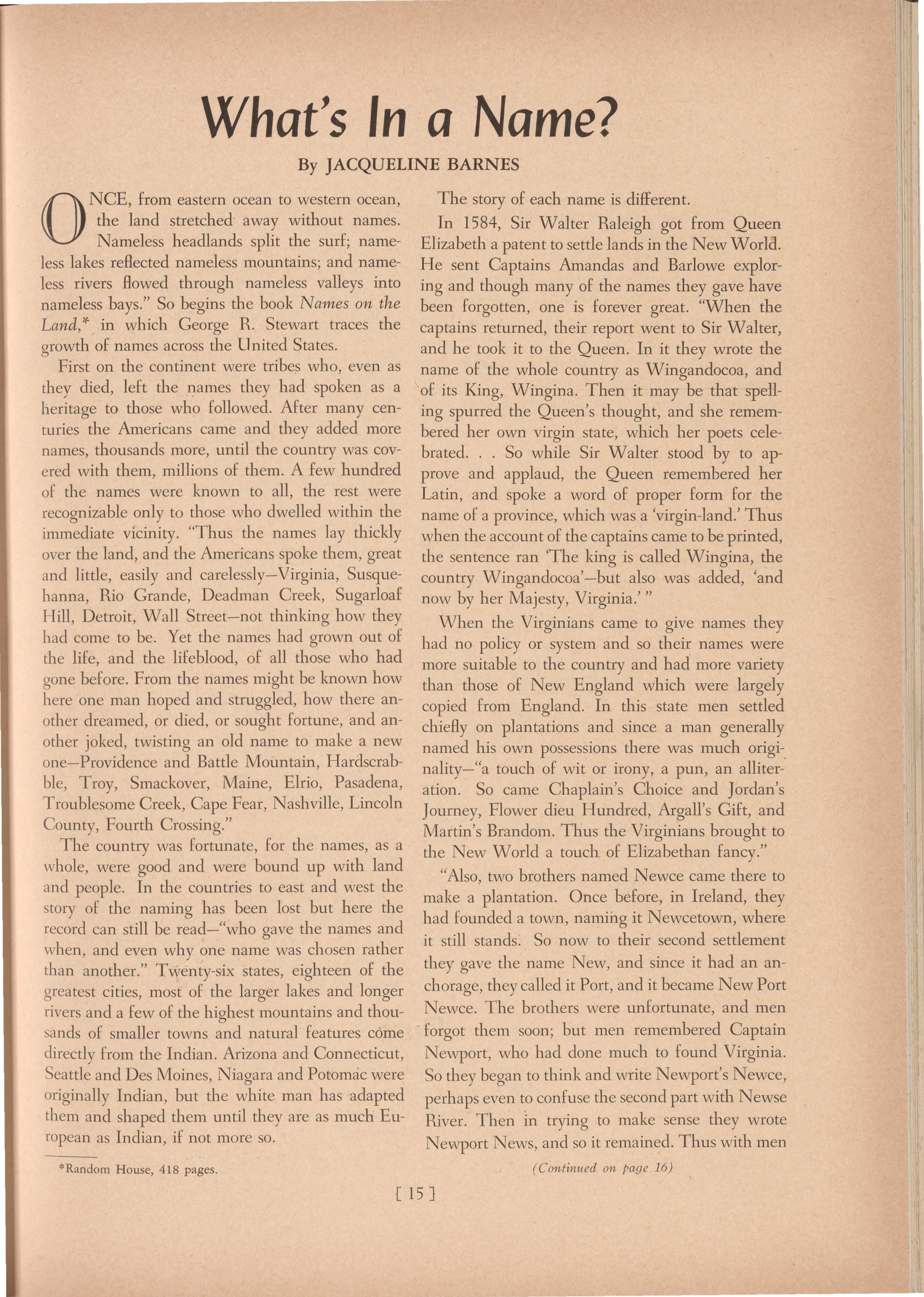
The story of each name is different. In 1584, Sir Walter Raleigh got from Queen Elizabeth a patent to settle lands in the New World. He sent Captains Amandas and Barlowe exploring and though many of the names they gave have been forgotten, one is forever great. "When the captains returned, their report went to Sir Walter, and he took it to the Queen. In it they wrote the name of the whole country as Wingandocoa, and of its King, Wingina. Then it may be that spelling spurred the Queen's thought, and she remembered her own virgin state, which her poets celebrated. So while Sir Walter stood by to approve and applaud, the Queen remembered her Latin, and spoke a word of proper form for the name of a province, which was a 'virgin-land.' Thus when the account of the captains came to be printed, the sentence ran 'The king is called Wingina, the country Wingandocoa'-but also was added, 'and now by her Majesty, Virginia.' "
When the Virginians came to give names they had no policy or system and so their names were more suitable to the country and had more variety than those of New England which were largely copied from England. In this state men settled chiefly on plantations and since a man generally named his own possessions there was much origi-. nality-"a touch of wit or irony, a pun, an alliteration. So came Chaplain ' s Choice and Jordan's Journey, Flower dieu Hundred, Argall's Gift, and Martin's Brandom. Thus the Virginians brought to the New World a touch of Elizabethan fancy.''
"Also, two brothers named Newce came there to make a plantation. Once before, in Ireland, they had founded a town, naming it Newcetown, where it still stands. So now to their second settlement they gave tl1e name New, and since it had an anchorage, they called it Port, and it became New Port Newce The brothers were unfortunate, and men - forgot them soon; but men remembered Captain Newport, who had done much to found Virginia. So they began to think and write Newport's Newce, perhaps even to confuse the second part with Newse River. Then in trying to make sense they wrote Newport News, and so it remained. Thus with men (Co nti111ted 011 pag e 16)
[ 15 J
"So That Wisdom and the Will of God May
Prevail"
(Co11ti1111edfrom page 8) make these prevail-for the pursuit, in a word, of perfection."
Mark: "And the pursuit of life, liberty, and happiness! Thank you!"
Matthew: "I shall not slacken."
Matt: "And you are not alone. Others fight our common cause. In fact, I have an appointment now to keep with Jacques Barzun. Au revoir, my American Don."
Mark: "Au revoir." (Impishly): "Vir dulciasme et lucidessme." Standing side by side, the two ,vatch the final rays of the sun die out and the entire wood is cloaked in darkness.
Variation on a Theme
( Co11ti1111ed fr o111pag e JO)
TERESA: I have my ways. I heard you talking to her on the phone.
BASCALE: You little devil. What would I do without you? (He kisses her. )
TERESA: I don't know, Tony, I really don ' t know.
BAsCALE: There won't be any more Madges , Teresa. I promise.
TERESA: It seems that I have heard those word s before, but last time it \;\,ras Alice, and the time b efore that it was Maxine. I could name them for an hour.
BASCALE: But this time it's really true. I'm getting old. I think that I should quiet down a little.
TERESA: All right, darling, but the next time that you go on tour, I'm going with you . Tour s a re your downfall.
BASCALE: Darling, you might not know it , but you were my downfall.
TERESA: That's just what I mean , Tony, you met me on one of your tours, didn't you? (She goes into his arms as the curtain falls.)
FINIS.
Autun1n Interlude
( Conti1111edf r o111('age l) 1 h h t doo I hate dogs. I ; 1f "I won't oo out wit t a t,' "bl I" tse ' ld be-w~l1 it would simply be imposs1 de. · wou ' ] l • , · was esper. The boy's jaw tightened an<. "11s "01ce T "L e lo e mv <loo· r'\te. ove m , , d }' ell i( you won't come foe amber eyes Ha he · 1 'the ·e is no use · h t tl at <loo t 1en 1 in comin me wit ou 1 t>' d I can 11 I l to be one o( u , an ee now th at at a • t 1as bled 't be me" l ler voice trem "I 1·k d k · 1t won · d 1 c - now11. h " he turned an I ·11 l · ~o-you -very -mucrhan, t ,el s1l )' 11g,~-~1 l eels clac1, clacl,, clacl ing down t e pat 1 1er eyesle 1 1 · ' . . d h . . ' . half blinded with tear , an t scarlet suit at last L l ·earl t leaves Th b l . 1 ~,lcnded into ti s h er oy , 111 s 1d0Ul'1, er drooping, defeat he. vy on 1 ace , s umpe to t1u b 1 I 1·s e) res turned , enc 1. L • from the direct1on she had o e • 11 e buried his ,nc, an<. 1 young face in the rough fur o~rn . r the doo. "Tell me, C resa r , "he\\hispcrcdhoarscly , "~ ' , , shcv rybeautiful ?" ol a . ·
What' In a
(C o11t11111 1!d f ro m p t1t,e 15 J 1c1r and names , a s with fishes in the sea, tJher \e gr ater o[ ten swallow up the smaller." \yes,
The author ha done an ob,iously tr nle h~ endou re search job with loving care he names -k ml~n th l a nd fascinate him, and as the reader follow~apta , the k . I . , 1 I b fon ta ' e a gnp on 11m, too \. r. , tcwart rn · tracct l the . . l I 1 · · l ' bl b ba · ongm anc growt, o an mcrcc I e num c.: r ol name s and has told their stories \\ ith humor and ] l h h ' I k · · ' Juke d a 1g1t sure touc w 1c1 ma cs mtcrestmg anh l ·] d. "1~1 \\ ' R 1mher. wort \\ 11 e rea mg. 1c cstcm escn cam th( I Iigh Desert ; The Dixie ( there arc t\\o of thcrinf l 1) nt )' the Firelands and the Purchase; the Piedmor I ~t Down East ; the Panhandle, the hcrokec Strii8 1Y the Eastern , hore and the Eastern Slope; o fan ' Land ; the Du s t Bowl" arc a test of one's acguaintbut ance with history and geography. But the name arcd ' more than a record of United tates history ; thefht are al so part of the poetry of America. The name to ' IC sing , and the song is fine and brave nnd strong. 'J C ...
Dusk
Gently , the darkness , lik e a mother Holds out her arms to light, v\lho reluctantly surrenders And merges with the night.
- PEGGY I IARRJS.
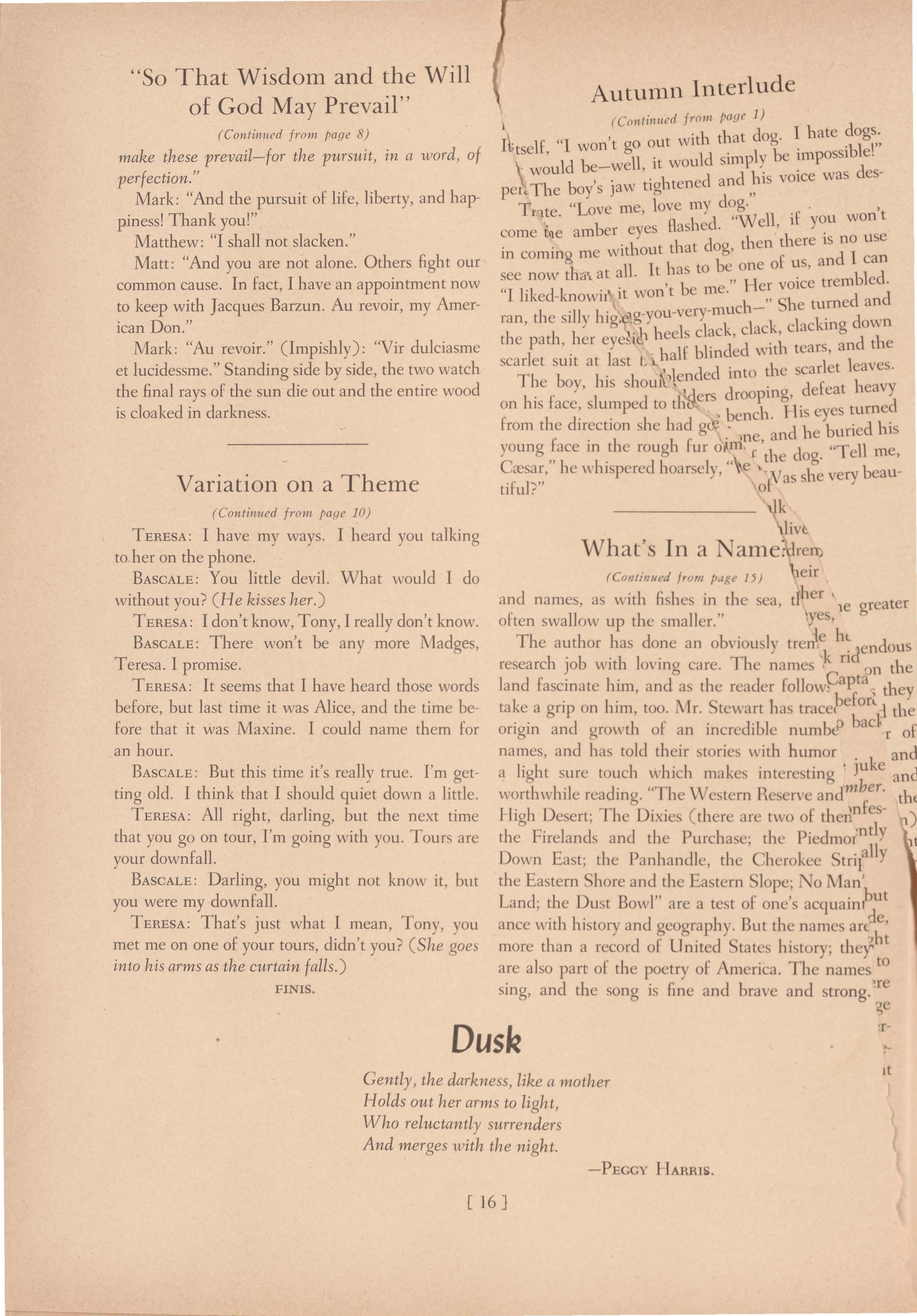
r -
[ 16 J l l
Satan to Milton
Wby h old est thou thy h ead so hi gh,
And gaze aro und vvith righteous eye, · though the world lay dirtied at thy feet?
Do s t think tha thou are more than man, 0 1ilt on, dost pretend thou can pproach th' eterna l Father's scat
V/ith apt and pr etty pica?
1\ ccurs'd he thee!
I , Satan, know th , pious heart or what it is, an actor 's part hat can h' freely donned and dofTcd in o uil e.
, \nd hast thou h eard what people say -
Thn t I with wicl ed pow'r can sway h · world throuoh cunnino trick ·rnd wile? 0 Irsuch l am, nnd thou mad 'st me, \Vh at can thou, 0 ~ilton, be?

Miltonto Satan
0 atan, truly thou art blind, ot l ; my vision unconfined
Transfixes lowly darknesses of hate.
Dost thou not know, wast thou not \.varc I wrote each entence with a prayer o o uid c my pen both true and stra ight , s if it were ~ad's tool?
Thou petty fool, 11earth and heaven scorn thy art; They know thy weak and Rimsy heart
That only dares to imitate the brave. And man can never really be ompletely in accord with thee.
l lis home is heaven; thine the grave!
0 Satan, thou arc lost for aye, The night of everlasting day.
-MARYLO U MASSIE.

